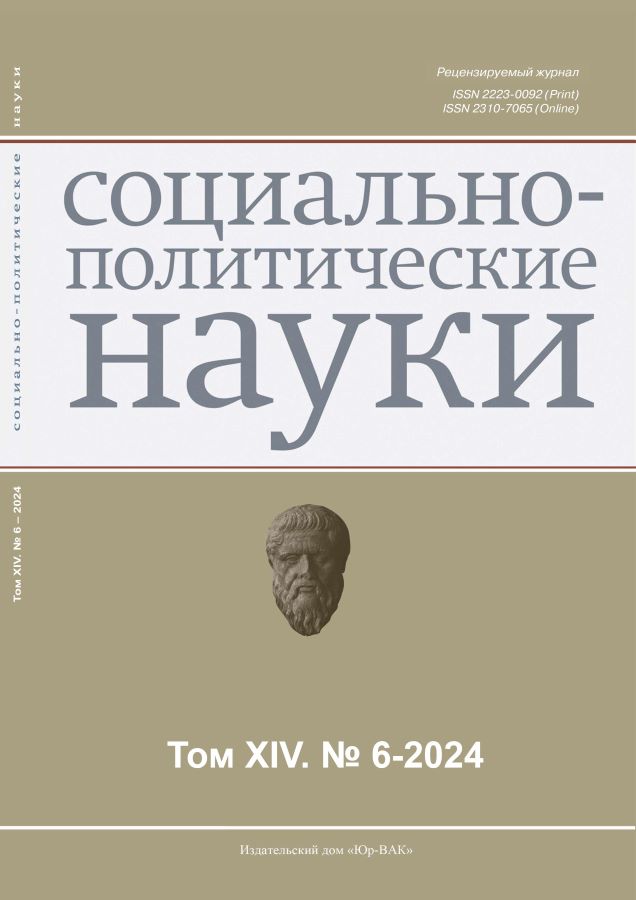Life guidelines and values of modern student youth in the context of socio-cultural transformation of Russian society (based on the results of a sociological survey)
- Authors: Likhanova T.Y.1
-
Affiliations:
- Federal Center of Theoretical and Applied Sociology of the Russian Academy of Sciences
- Issue: Vol 14, No 6 (2024)
- Pages: 39-45
- Section: History and Theory of Politics
- URL: https://journals.eco-vector.com/2223-0092/article/view/653973
- DOI: https://doi.org/10.33693/2223-0092-2024-14-6-39-45
- EDN: https://elibrary.ru/CTIJCZ
- ID: 653973
Cite item
Abstract
Studying the life orientations of students is important for understanding the processes taking place in the minds of the younger generation, which is being formed under the influence of various factors and subjects.
The purpose of the study is to determine the characteristics and dynamics of the student youth’s life orientations based on their value and target priorities.
The results of the study of student life orientations and their dynamics demonstrated a shift in value priorities towards the values of individualization, as well as strengthening the position of adaptation values. The values of socialization related to social interaction and integration in society have receded into the background. On the one hand, bringing the values of individualization to the fore means stabilizing the socio-economic situation in the country, when young people can shift their focus from values that ensure survival to the values of self-improvement and self-actualization. On the other hand, the priority of individualization values marks the cultural and value transformation of Russian society, the risk of an intergenerational value gap. The analysis of the dynamics of gender differences in value orientations indicates the transformation of gender roles, the shift of the traditional focus for men from adaptation to individualization, as well as the increasing role of women in maintaining adaptation mechanisms.
Keywords
Full Text
About the authors
Tamara Yu. Likhanova
Federal Center of Theoretical and Applied Sociology of the Russian Academy of Sciences
Author for correspondence.
Email: likhanova@испи.рф
ORCID iD: 0009-0008-8979-6522
Institute of Socio-Political Research, junior researcher
Russian Federation, MoscowReferences
- Zimnaya I.A. Pedagogical psychology. Moscow: Lotos, 2004. 480 p.
- Inglehart R. Postmodern: Changing values and changing societies. POLIS. Political Research. 1997. No. 4. Pp. 6–32. (In Rus.)
- Inglehart R., Welzel K. Modernization, cultural changes and democracy: The sequence of human development. Moscow: New Publishing House, 2011. 464 p. ISBN: 978-5-98379-144-2.
- Lapin N.I. Values in a crisis society. In: Values of social groups and the crisis of society. N.I. Lapin (ed.). Moscow: IFAN, 1991.
- Parsons T. The system of modern societies. M.S. Kovaleva (ed.). L.A. Sedova, A.D. Kovaleva (transl. from English). Moscow: Aspect-Press, 1998. 270 p. ISBN: 5-7567-0225-3.
- Perevezentsev S.V., Selezneva A.V., Evgenieva T.V. et al. Russian values: Traditional meanings and their reflection in the consciousness of modern youth. Collective monograph. S.V. Perevezentsev, A.V. Selezneva (eds.). Moscow: Quadriga, 2024. 720 p. ISBN: 978-5-91791-519-7.
- Selezneva A.V. Russian youth: A political and psychological portrait against the background of the epoch. Moscow: Aquilon, 2022. 288 p. ISBN: 978-5-906578-81-5.
- Sillaste G.G. Methodology and paradigm shift in the study of sociogender space and gender equality. Bulletin of the Russian State University. Series: Philosophy. Sociology. Art History. 2022. № 1-3. Pp. 327–328. (In Rus.)
- Suprun V.I. Values and social dynamics. In: Science and values. Novosibirsk, 1987. 240 p.
- Philosophy: An Encyclopedic Dictionary. A.A. Ivina (ed.). Moscow: Gardariki, 2006. ISBN: 5-8297-0050-6.
- Yanitsky M.S. Value orientations of personality as a dynamic system. Kemerovo: Kuzbassvuzizdat, 2000. 203 p. ISBN: 5-202-01717-0.
Supplementary files













